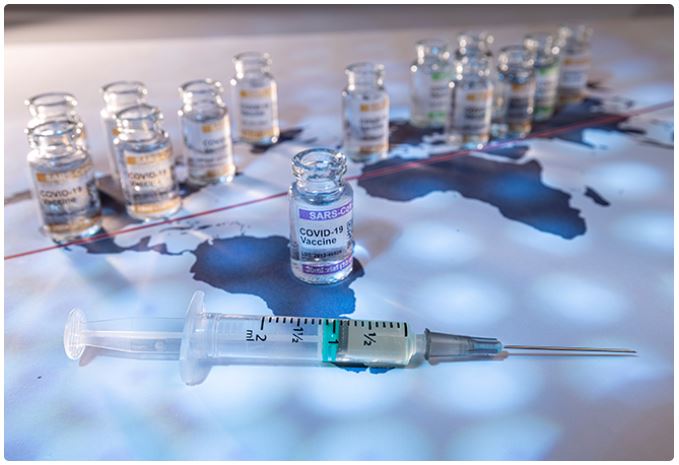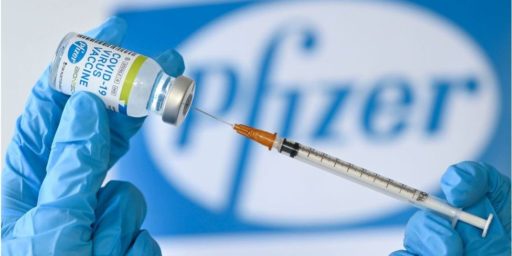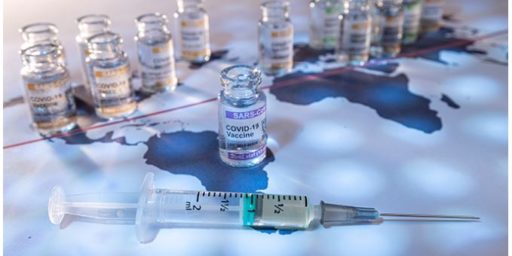Fourth COVID Dose May/May Not Be Needed
Mixed messages from the pharmaceutical companies.

Axios/YahooNews (“Moderna president: 4th vaccine dose only necessary for certain groups“):
A fourth dose of the COVID-19 vaccine will likely only be necessary for elderly and immunocompromised people but not for the general public, Moderna president Stephen Hoge told Business Insider on Monday.
[…]
For those who are immune-compromised, those who are older adults, over the age of 50 or at least 65, we want to strongly recommend and encourage [a fourth shot], the same way we do with flu vaccines,” Hoge said.
But Hoge stopped short of recommending fourth doses of the vaccine for the general public and said he doesn’t expect “any kind of recommendations that would be across the board for everyone.”
“Whether or not public health continues to recommend it for everybody is a more complicated thing, because not everybody’s wanting to get the first couple ones.”
The Hill (“Pfizer CEO says a fourth booster shot ‘is necessary’“):
Pfizer CEO Albert Bourla said on Sunday that a fourth dose of the COVID-19 vaccine will be necessary to continue to help keep hospitalizations manageable and sicknesses more mild.
“Right now, the way that we have seen, it is necessary, a fourth booster right now. The protection that you are getting from the third, it is good enough, actually quite good for hospitalizations and deaths,” Bourla said while appearing on CBS’s “Face the Nation.”
“It’s not that good against infections but doesn’t last very long. But we are just submitting those data to the FDA [Food and Drug Administration], and then we will see what the experts also will say outside Pfizer,” he added.
[…]
Countries including Israel, Chile and Germany have already begun recommending fourth COVID-19 doses for high-risk groups.
“Face the Nation” host Margaret Brennan asked Bourla if he expects to be able to avoid the same confusion over booster shots that came about when the third vaccine dose was being deployed.
“I think so. And I think right now we need to be very well coordinated, CDC [Centers for Disease Control and Prevention], FDA and the industry so that we are all providing to the American people and to the world a cohesive picture rather than confusion,” he said.
Given that both firms stand to make a lot more money if annual boosters become routine, one presumes this difference is one of prognostication and risk assessment rather than greed. It may also be that Moderna’s version of the mRNA vaccine is slightly more effective long term than Pfizer’s.
Ultimately, I’ll do whatever the CDC and/or FDA recommend. Thus far, at least, everyone in my family has had relatively mild adverse effects after the shots (the wife and I have had three Moderna jabs, the four kids over 13 have had three of the Pfizer, and the 10-year-old has had two of the Pfizer). Thus far, none of us have had COVID. I’d like to keep it that way.






My understanding is that the nano-bot chips in the Pfizer vaccine were a different design than the ones in the Moderna vaccine, and they keep getting disconnected from the 5G control towers. That’s why they’re probably going to push a fourth Pfizer shot in particular – to ensure we all have the more effective chips before they activate the towers.
This is my thinking too. I’m sure there will be a lot of grousing about what a bunch of idiots they are and there is no harm to getting more shots, or why can’t they just have a clear message or something else. But even a little google-fu reveals studies that show that past a certain number, giving people additional doses of a vaccine can result in diminishing protection. Not just no additional protection, but actually less protection. Those studies were done on a different vaccine for a different disease, so the CDC has to figure out the probability it applies here and, if so, what the point at which diminishing or negative returns sets in. Bottom line, when you don’t have anything but your “common sense”, it’s all very obvious what to do and those mindless bureaucrats are just dithering idiots. When you actually do know things, the decisions aren’t as clear cut.
@MarkedMan: TLDR: “The more you know, the more you know you don’t know”
An Israeli study of fourth doses of Pfizer given to healthcare workers shows little difference in protection.
Me, I’d prefer a variant-specific shot, even for a variant on the wane. That should make for broader protection overall.
It may be, too, that the strategy of focusing on the spike protein is limited. Though thus far I’ve not heard much about results from sub-unit vaccines, nor from dead or inactivated virus vaccines.
I wonder if they are still playing around with dosages and/or intervals? Remember Pfizer primary shots and booster shot had 30 micrograms while Moderna had primary shots at 100 micrograms with the booster at 50. Picking the dosage and intervals is pretty much an educated guess. So will the need for a fourth booster.
My wife and I have all three shots (hers was Pfizer and mine was Moderna). She ended up in the last wave with a moderate infection (fever, headache) and I never got it (or more accurately, I never got the symptoms). But if recommended, I’ll get the shot along with the flu shot. Why? Because I’m not a dumbass.
@MarkedMan:
There’s a lot of bad science out there – generally caused by not correcting for patient populations. If you only (or primarily) give boosters or 4th shots to the elderly and/or immune compromised people without proper correction for your patient population, it’s easy to create data that makes it look like these boosters aren’t helpful. The early papers with “boosters only work for 2-4 months” is littered with such examples, since the people who got the first boosters were all in the most high risk/immune compromised groups.
I’d be extremely skeptical of any paper/person who suggests that any booster provides “Not just no additional protection, but actually less protection”.
And this is what the sane world is up against – video in the tweet:
https://twitter.com/TheGoodLiars/status/1503470345436684289
Fortunately there are subtitles so you don’t have to actually listen. But JFC how are we going to deal with these people?
@Not the IT Dept.: Normally, we simply wouldn’t deal with them. The problem is that they are 30 or 40% of the population now. Wow! I got nuthin’. Acres and acres of it.
@Crusty Dem: I can’t find the article I mentioned in the comments within the last month, but here’s a description of a study that’s a bit older. It’s frustrating, because the newer article was about another, newer, study meant to look for this specific effect and actually contained a hypotheses about what might cause it.
@MarkedMan:
IMO it’s compounded with bad science reporting. The article states:
How much more likely? How do kids who vaccinate yearly compare with unvaccinated children? How about children who got the shot last season but not this one? How about two season ago but not last year’s and this one?
If the vaccine is protective, what year should you get it in? This year? Next year? How about one year on and one off?
Three was a brief report about the AZ COVID vaccine, stating the first dose produced antibodies against the virus vector as well as SARS-CoV-2. This led to the second dose being less effective vs SARS-CoV-2, as the vector got partially stopped by antibodies before it could get into cells to deliver the genetic material to make spike proteins.
Something similar may be happening with the flu vaccine, even if it doesn’t use a virus vector.
@Kathy: You’re right that all those questions are important, but that doesn’t make this “bad science”. This initial study, published 7 years ago, doesn’t attempt to address any of those question but is merely trying to lay out future research. If I can get the time tonight, I will see if I can track down that second paper I mentioned. Bear in mind though, my whole point is that the picture is not as clear cut as it appears to “common sense”.
@Kathy: My reading skills are declining as I get older, but your citation seems to be concluding (in general terms) that people studied in longitudinal studies are more likely to become sick than people in single event studies. That has a “well DUH!!!” quality to it at best. It seems to me that if one wants to avoid becoming a statistic, the answer is simple–don’t participate in studies, but particularly not longitudinal ones.
@MarkedMan:
Don’t bother looking up the other article. As you say, things are far more complicated than we’d like them to be, or what a cursory knowledge of immunity would lead one to believe.
The immune system is an adaptation to the existence of pathogens in the environment. The pathogens, however, need to adapt to our adaptation. Vaccines are art of all this, and the interplay is complicated.
I’m beginning to suspect there is no lasting immunity against respiratory diseases for some reason.
@Kathy:
It makes sense when you think about it. There is no where else in your body where the membrane between outside and inside is so thin. It passes gas molecules! And, given the fractal nature of alveoli, there is so much surface area! And you inhale cubic meters of bacteria and virus filled air every day!
@Not the IT Dept.:
Son-of-a-bitch, and here I always thought Ovid was a Roman poet. Glad to be enlightened.
Science is messy. Hoocoudanode?
@MarkedMan:
There’s been talk of administering COVID vaccines vis nasal inhalation. I’ve heard that about flu vaccines as well. I don’t know whether it would make any difference. The idea is to get the “immunity” where the virus attacks, the airways.
It seems rather naive and like sympathetic magic to me, but seeing how the vaccine protection wanes with both COVID and flu, I guess there’s no harm in trying.
@Kathy:
In my first year at MCU, 2013, they allowed civilian employees to get the flu vaccine and offered the choice of a traditional injection or the inhalation. It was the first I’d heard of it. Alas, it’s not recommended for those over 50 so that was my first and last dose.